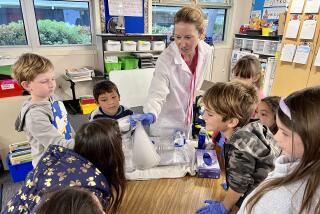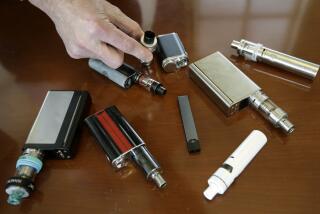Science Fair Tests Students’ Creativity
- Share via
For many of the students at Mesa Junior High School in Somis, the hardest part of entering a project in their school science fair was to come up with an interesting idea.
“That’s where they make that creative leap,” said Debby Dunn, a science teacher at Mesa.
But for the eighth-grade girl who won the grand prize in the science fair at Mesa this week, finding a topic was no problem: She got the idea from her mother.
Instead, 14-year-old Michaela Vanoni said, one of the more difficult parts about her experiment was just waiting to see the results.
Michaela, one of several Mesa students who will go on to the Ventura County Science Fair next month, wanted to answer one question: Will water hyacinths act as a biological filter?
Her mother had read in a magazine that the plants could filter pollutants from dirty water, acting as a sort of natural decontaminant.
But Michaela had to prove it.
After doing the initial work of filling two buckets with dirty ditch water and two with clean well water, and then putting hyacinth plants in each, all she could do was wait.
First she waited several weeks for the plants to do their work. Then she had to wait for results from the lab where she had the water samples tested.
“It was suspenseful,” she said. “I had to wait until the test came to see if my project worked.”
It did. And Michaela said she’s excited to take her results to the Ventura County Science Fair on April 19-21.
All sixth- through eighth-grade students at Mesa are required to do science projects. But not all are able to come up with their own topics or lucky enough to have their parents suggest ideas.
For these children, Dunn said she has books giving different ideas for science experiments.
But the best ideas are not found in books, she said.
“The ones that come out of the books are more cookbook-y and they’re not as original,” Dunn said.
Usually, students who win the Mesa science fair are those with the most original ideas.
For example, the first-place winner in the medical science category this year was Chellie Moore, whose project examined whether people who suffer from asthma are able to exercise better when they use inhalers.
Because she has asthma herself, Chellie performed exercises for her experiment and also enlisted help from her brother and several classmates. Her conclusion: Inhalers help.
Now, Dunn said, the eighth-grade student has to do a follow-up experiment to find what type of inhalers work best.
More to Read
Sign up for Essential California
The most important California stories and recommendations in your inbox every morning.
You may occasionally receive promotional content from the Los Angeles Times.













